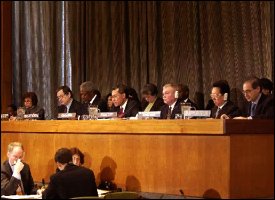
United Nations Decolonization Committee
Basseterre, St. Kitts – Nevis
May 08, 2009 (CUOPM)
Delegates to the Special Committee on Decolonisation annual regional decolonization seminar in St. Kitts – Nevis from 12 to 14 May will examine present-day challenges and opportunities.
It will be the last Caribbean seminar conducted in the framework of the Second International Decade for the Eradication of Colonialism (2001-2010).
Hosted by the Federal Government of St. Kitts and Nevis, the three-day seminar will examine challenges and opportunities in present-day decolonisation in the Caribbean and Pacific regions and elsewhere.
Among the issues to be discussed are: the decolonisation process in a changing world; strengthening cooperation with the administering powers; the Special Committee’s role in facilitating enhanced outreach to and participation by the peoples of the Non-Self Governing Territories; and the way forward for the United Nations decolonisation process in the remainder of the Second International Decade and beyond.
The Seminar will examine the role of the United Nations system in promoting and providing development assistance to the Non-Self-Governing Territories. It will provide a fresh opportunity to hear the perspectives of the administering Powers and territorial Governments, as well as the views of experts and civil society.
Participants will include the delegation of the Special Committee — also known as the Special Committee of 24 and formally as the Special Committee on the Situation with regard to the Implementation of the Declaration on the Granting of Independence to Colonial Countries and Peoples.
Also taking part will be representatives from Member States, administering Powers and Non-Self-Governing Territories, in addition to experts representing non-governmental organizations and civil society from Non-Self-Governing Territories.
Their contributions and the Seminar’s discussions will serve as a basis for conclusions and recommendations to be studied at the Special Committee’s substantive session in June. Proposals will then be submitted to the General Assembly concerning the fulfillment of the objectives of the Second International Decade for the Eradication of Colonialism.
The Special Committee’s current membership comprises 28 Member States: Antigua and Barbuda, Bolivia, Chile, China, Congo, Côte d’Ivoire, Cuba, Dominica, Ethiopia, Ecuador, Fiji, Grenada, India, Indonesia, Iran, Iraq, Mali, Papua New Guinea, Russian Federation, Saint Kitts and Nevis, Saint Lucia, Saint Vincent and the Grenadines, Sierra Leone, Syria, Timor-Leste, Tunisia, United Republic of Tanzania and Venezuela.